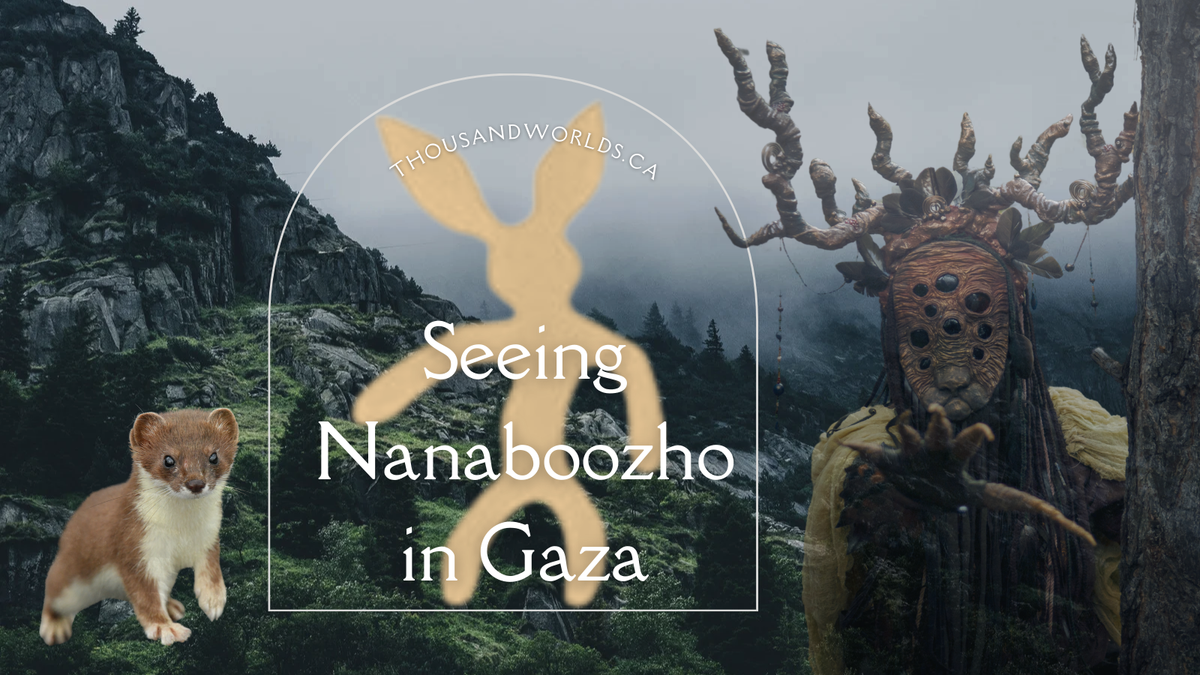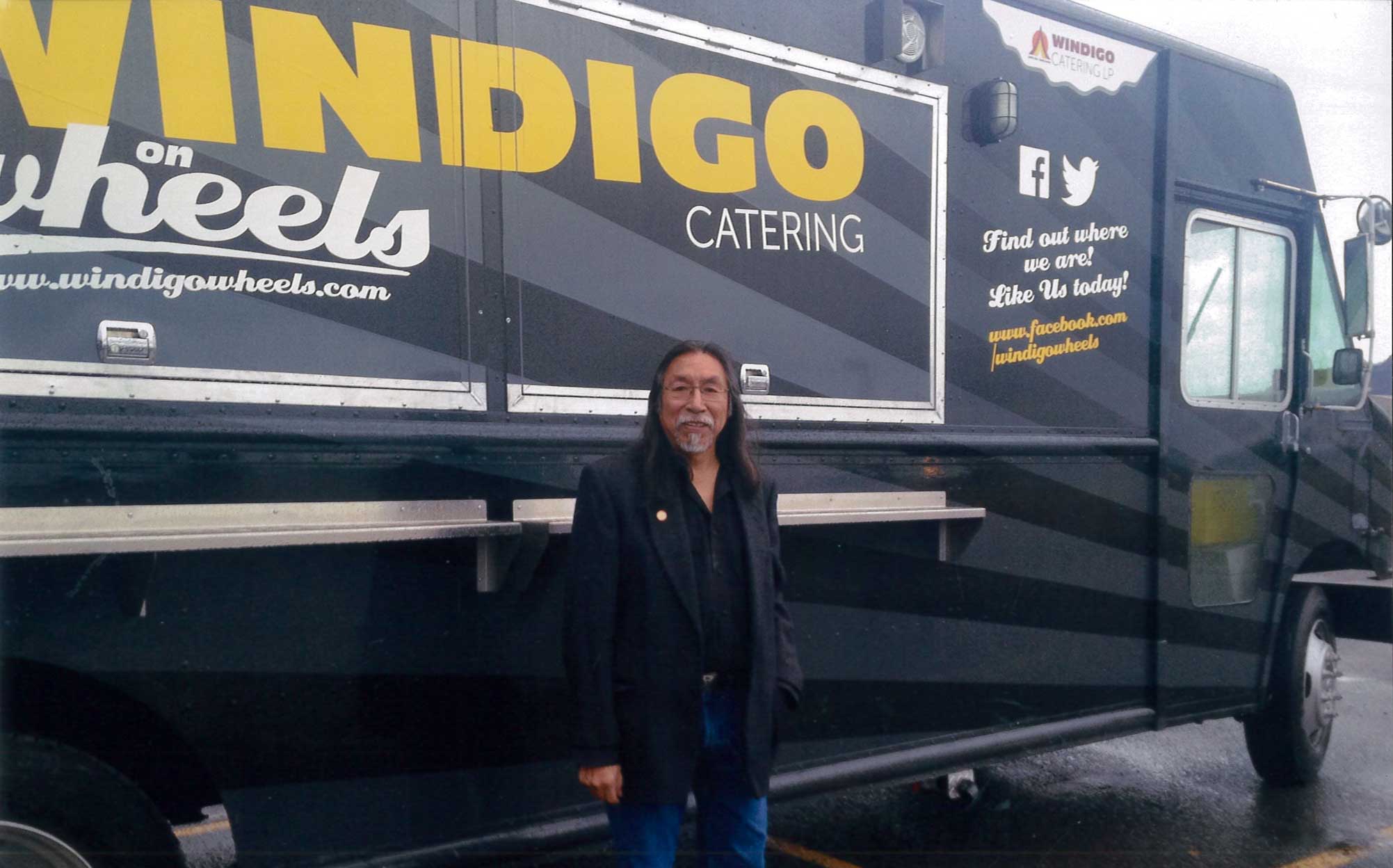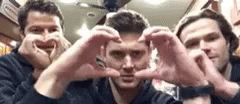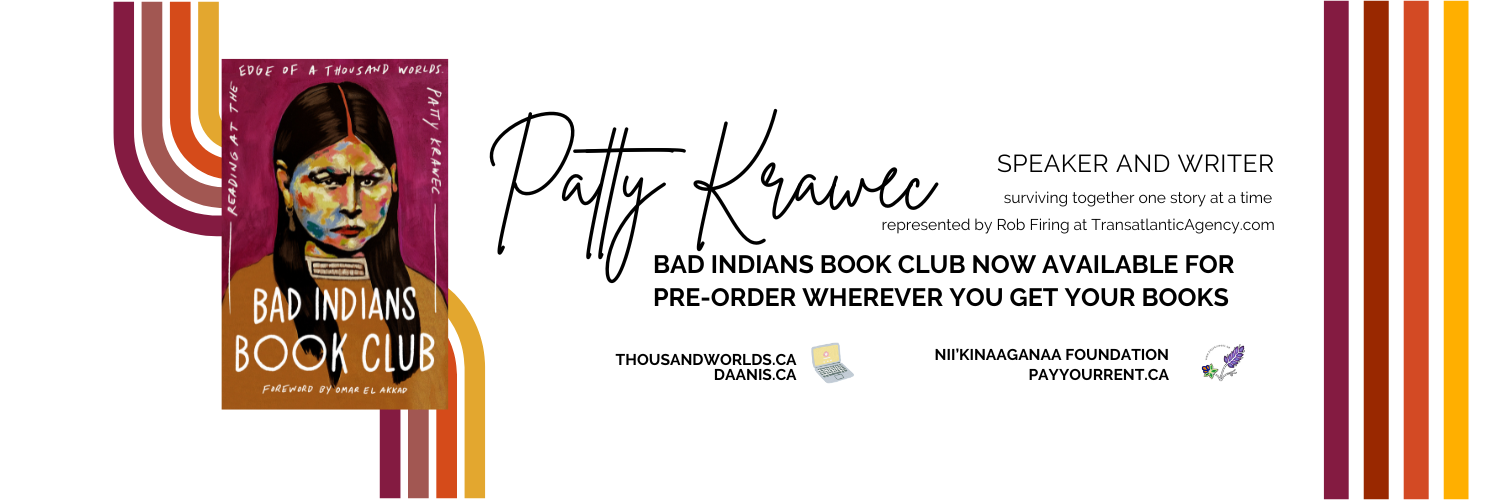Seeing Nanaboozho in Gaza

This is a windigo story, and that's the only time I'll mention that monster's name. We'll just call him W ok? It's kind of like Beetlejuice, you don't want to say the name too many times or you'll call it's attention. A lot of people (myself included if you've read Becoming Kin) don't observe this prohibition, and there's a whole First Nation in Canada that bears that name. Idk, maybe that ship sailed a long time ago and the Ws walk among us without anybody caring or even noticing and if Basil Johnston is right then we've turned them into heroes anyway. Johnston refers to corporations, conglomerates, and multi-nationals as contemporary Ws in his book The Manitous but I don't know about that.

It is pretty bold to disagree with somebody like Basil Johnston, but the market forces and social/political views that drive corporations, conglomerates, and multi-nationals did not emerge here. They emerged in Europe. We didn't infect them, this place did not infect them. They brought their own monsters when they came here, although I will allow that monsters of greed and avarice are a global problem and who knows. But maybe he's right. Although those monsters came here clinging to the likes of Adam Smith, maybe they did naturalize and develop a monstrousness that is rooted here. You are what you eat amirite?
There are a lot of stories about Ws with and without Nanaboozho. These giant cannibal monsters are a pretty persistent problem for the Anishinaabe and I'll tell you that my perspective on them changed when I read This Place: 150 Years Retold. This graphic anthology collects the stories of Indigenous writers about the past, present, and future. It includes the story of the Fiddler brothers, a story told in greater detail in Killing the Shamen by their descendant Chief Thomas Fiddler. It begins in Sandy Lake Ontario, one hour north of Sioux Lookout by plane - you can't drive there, no roads - and tells the story of Jack and Joseph Fiddler who were charged with the murder of Wahsakapeequay, a woman they believed to be possessed of a W. They were charged and convicted, sentenced to death causing one of the brothers to point out that the Canadian state was doing to them what it accused them of doing to Wahsakapeequay ... and for much the same reason: eliminating a threat posed to the community.
Reading this story I realized that for the Ojibwe in northwestern Ontario these monsters were real. They were real like demons are real for devout Christians. Real like any spirits are real for those who believe in their existence. They weren't just a metaphor or cautionary tale about greed and imbalance. I actually re-wrote a chapter in Becoming Kin that talks about Ws after reading those books.
Before we go further, hello to new members! Paid subscribers help keep the lights on, but everyone can expand my audience by sharing this post through email or on social media.
This week we're considering William Jones' story Nanabushu and the Windigo with Basil Johnston adding some insight about this creature along telling with a similar story from Mille Lacs region in Minnesota in his book The Manitous (p 231) and an episode of the TV show Supernatural. As always, these are just personal reflections, they are not meant to be seen as an authoritative statement on what these stories mean, as if there was a singular meaning. Which there isn't. I reflect on these stories to put them into conversation with your own, not to try and convert you to the religion of the Anishinaabe.

In the second episode of the first season of Supernatural, Sam and Dean investigate a killing that turns out to be a W, and they mostly get the backstory right. This creature is made when somebody, on the verge of starvation, kills and eats another human. I don't know what an Ojibwe monster is doing that far west of the Pecos, or what good the Anansazi symbols Dean draws for protection are going to do against a creature who presumably speaks Anishinaabemowin but this is a TV show and not a documentary, right? Sam stays with the unhappy campers while Dean tries to lure the W away, but the W prefers Sam (so do I) and corners the group. Thankfully Dean circles back and shoots a flare gun into the monster's chest who then goes down in flames.
Our story might have gone differently if Nanaboozho had a flare gun.
The prophet Bruce Cockburn. He knows what's what.
Once again we find Nanaboozho walking along a shoreline when he spies an enormous being on the other side. The tops of the trees didn't even touch his butt that's how big he was. Obviously this is a W. Like a fool (Jones' words) Nanaboozho calls out to him "hey younger brother, you eased yourself on the tail of a beaver." I don't know why this is an insult, but I guess it is. When I asked google about it the AI suggested that it is a sexually suggestive idiom, so while my experience of google AI is that it isn't particularly reliable this is an interesting notion. Maybe Nanaboozho was calling the W a "beaver fucker" or something like that. Not nice. Like many of us, Nanaboozho is very brave from a distance, but you better have a plan if you're going to provoke a monster and Nanaboozho had more bravado than plan.
So yeah, the W was pissed, grumbling to himself that Nanaboozho thinks wiin is the only manitou around. And with that the W lopes around the shore and confronts Nanaboozho. Immediately the W lays down with his butt in the air. Little frog pose if you're into yoga, typically something you see in children and babies but adults do it too although it is less frequent outside of yoga classes. Nanaboozho sees the W lying down this way, and Jones makes a point of telling us that the W's anus was pretty big which isn't that surprising, but what is a little unusual, anatomically speaking, is that Nanaboozho could see right up to its heart. And it isn't like the Ojibwe didn't understand about intestines and whatnot, they are hunters after all.
The W begins ordering Nanaboozho around, telling wiin to gather wood, make a fire, etc. because the W wants to eat, but he also wants to make wiin suffer. Nanaboozho does all this while crying about impending death. The W sends Nanaboozho out to find the perfect roasting stick, telling wiin to make sure it is not too curved because it will hit the spleen. I told you the Ojibwe knew things about inner organs. This is just the W wanting to prolong Nanaboozho's suffering. Hit the spleen and you bleed out pretty fast.
In Johnston's version from Mille lacs there's a little mouse who asks why don't you just run away while you're out gathering wood to which Nanaboozho points out the speed of this monster and wiin's own isolation. The mouse then asks, why don't you kill him? Nanaboozho replies, I would if I could. So the mouse makes a suggestion which Nanaboozho follows. In Jones' telling Nanaboozho comes across a weasel rather than a mouse, and when Nanaboozho describes the monster's yoga routine, the weasel offers a strategy.
Ok, says the weasel. I got this. And if I do kill him then you will reward me ok? Nanaboozho agrees and carries the weasel back to camp hidden in his shirt along with a pretty fine roasting stick. Wiin whips out the weasel who zooms up the anus and into the W while Nanaboozho taunts him about making the stick. You sharpen it if you're so smart. Aren't you going to kill me? Just stab me already.

The W senses that something is very wrong, as if something is biting around his heart. Nanaboozho continues taunting him and the W falls unconscious and then dies, presumably of internal bleeding. The weasel hops out and presents himself to Nanaboozho, who had a promise to keep. After washing the little weasel clean, Nanaboozho takes some white clay which he burns to make it pure white, and then paints the weasel with it. The little weasel runs around, pleased with his new coat and proud of how he looks. Every winter, Nanaboozho tells him. Every winter your coat will be white and beautiful for as long as the world lasts. And wiin continued along the shore. In Johnston's version Nanaboozho, advised by the mouse, runs a sharpened stake right up the W's backside, killing him.
Nanaboozho, despite being a manitou, is badly outgunned by this giant wiin misguidedly taunted. See why we don't mention the name? And making the weasel white, It's more than aesthetics. That white coat keeps the little guy safe in the snowy winter doesn't it. Pretty clever reward.
If I have learned anything from reading and watching thrillers it is that if you cannot defeat your enemy, the second best thing is to just keep surviving. Stay alive and watch for something to change, some kind of opportunity. That's what Nanaboozho is doing here, wiin is staying alive. The bravado is gone, wiin is definitely humbled and legitimately afraid of dying. The W meanwhile is pure arrogance. I cannot think of a more vulnerable position to lie down in than having your butt in the air, and yet that's how invincible this W felt. Showing his whole ass and not giving a single fuck.
Meanwhile this little weasel was not the target of the W's attentions, which gave him the ability to act. And sure it's kind of gross but Nanaboozho could see all the way to the W's heart so maybe the W's internal organs aren't quite the same as ours. The second round of taunting from Nanaboozho is a little different. Instead of being filled with bravado, this taunting is strategic. The W knows that something is wrong, but Nanaboozho keeps the W's attention on wiin to give the weasel time and it works. The W dies. In Johnston's story from Mille Lacs Nanaboozho learns something from the humble mouse, the one animal in the woods who was sympathetic to his plight because we all know that Nanaboozho can be a real jerk.
This story speaks pretty clearly into our current moment.
The other night I had dinner with a friend. This friend is Palestinian and we hadn't gotten together for a while so we had a lot to talk about. She told me about going back to Palestine late last year, the things she and her family saw and experienced while they were there. The enormity of the Israeli state against the smallness of the Palestinian people. The loss of land, the complete impunity of Israeli settlers who take over Palestinian homes and farmland simply by walking in and occupying it. The beating endured by a friend. The interrogations by security at checkpoints or just on the street. The pervasive loss of hope illustrated by her story of an old man she knows who no longer says "Inshallah" which many Muslims use as a kind of punctuation, ending comments or thoughts with inshallah: if Allah wills it, God willing. It's a hopeful statement, assuming a future this old man no longer believes in. As we talked about the helplessness we are all feeling in the face of Israel's unchallenged brutality, she told me how much she appreciated my speaking out because although there is much that she is doing, she does not feel safe speaking out.
I do my best to talk about Palestine on social media and when I give remarks or lead webinars, demonstrating the similarities between Palestinian displacement and our own. I talk about the legal fictions and formation of militarized police forces to protect what they stole. You've certainly noticed that it comes up in these blogs. It is honestly the very least, the bottom of the barrel least, that I can do. What does it cost me? Nothing. I mean, maybe it does. I have no idea. It could be costing me speaking gigs, people who might want to hire me but choose not to because the most superficial scan of my social media reveals my political position very quickly. I don't know. Nobody is going to email me and say that they would have hired me except ...
Did I tell you about the time I allowed myself to be silenced?
On October 8, 2023 I spoke at a local church. They had invited me on the Sunday before Thanksgiving to talk about the land and I had chosen Leviticus 18:28 as my text: If you make the land unclean it will vomit you out. On October 6th I emailed the team to let them know that one of the most famous clobber verses is a little earlier in this passage and I was going to touch on it briefly because I didn't want anyone thinking that I agreed with it, that believing in civil rights and inclusion for 2SLGBTQIAA people in any way made the land unclean. The pastor responded immediately, call me. In that call he said that I had agreed not to bring up queer things and although that doesn't sound like something I would agree to, I thought that I must have said something that lead him to believe I would not do this.
I had already gotten them to learn the song Testify to Love, which I had learned a month earlier when I spoke at the Nevertheless She Preached conference in Austin Texas where queer and trans life is celebrated and welcome. To me, this song sounds like a queer anthem. So I agreed not to say anything. I was new to public speaking, and afraid to refuse.
Then October 7 happened.
And I reasoned that if they did not want to hear about queer people, they definitely did not want to hear about Palestine. I slipped in some references that I later learned some people in the audience understood. They understood the song. They understood my quoting of the lyrics "from the mountains to the valleys, from the rivers to the sea." They understood what rippled beneath my words that morning, and although I did speak plainly in the lobby afterwards to anyone unfortunate enough to strike up a conversation with me, they understood why I didn't speak plainly from the stage.
Never again. I have never again allowed myself to be silenced because more than a year later that still haunts me. It is a painful memory for which I do not seek or want absolution. The painfulness of it is a living reminder, much like Porcupine's broken feet, and there is no excuse or justification for it. I was not brave. I was not principled. I was afraid and focused on myself. But never again. Just over a month after that speaking engagement I wore a keffiyeh when I took the stage in front of 600 people who work with refugees. I spoke after the deputy minister for immigration and her smiles quickly turned upside down as I began my remarks. Along with everything else I said about the needs of migrants and our obligations of generosity and welcome, I talked about Palestine. My voice was shaking. But I refused to be silent. I realized that the W was not aiming at me anyway, so I ran right up the ass and bit its lying heart.
These two versions of the story offer us pathways to resistance that depend on the moment we find ourselves in, three if you include Dean and his flamethrower. The mouse and the weasel offered different strategies of support. Palestinians are terrified. They are desperate. They are also organizing but at great risk to themselves and to their relatives still in Israeli-occupied Palestine. They sharpen their sticks and ram it as far as it will go. Sharing things on your social media is the very bottom of the barrel least you can do, but it is an encouragement to those who are sharpening their sticks, it tells them they aren't alone. They don't need our advice, we really aren't the mouse in this story because there isn't anything about resistance that we can teach Palestinians who have been at it for the last 77 years, but we can offer encouragement and support. There's more we can do. Eight months after allowing myself to be silenced I was in Vancouver and joined with others on a railway blockade where I witnessed police violence; the Vancouver PD moving in on us AFTER we had cleared the train tracks, pushing us back over the tracks so they could accuse us of trespassing.
There are things that Palestinians can do, and they are doing them. Coordinating aid, fundraising, contacting public officials, and more. But like Nanaboozho, they are also trapped in a political reality that is designed to crush them. There is nowhere for them to run that the W can't follow and get there first. Remember when Israel told everyone to go south to Rafa? Then they bombed Rafa too. There is literally nowhere for them to go. Current and former officials are so confident in their impunity they are lying down with their ass in the air, telling the whole world things like"every child in Gaza is the enemy, we need to conquer Gaza and settle it. Not a single Gazan child should remain there. There is no other form of victory."
So be the weasel. You can say and do things that Palestinians cannot. And not because first they came for this group and that group and then nobody was left to save you. What a terrible, transactional kind of solidarity that is. Chances are, particularly if you are white and straight, nobody is coming for you. Ever. Which sets you free to do what you can, and as well as some things you did not think that you could. Run right up the ass of that W and take a bite out of his heart. Throw sand in the gears, metaphorically or literally. Work from the inside of whatever organization or community you are part of. Divestment of pension investments is happening. The BDS movement is not just for individuals, it is meant for organizations. Put that on the agenda. The point of the rail blockade I participated in was not to stop the trains forever. It was just to stop them for a few hours. No business as usual. Not until these western nations that built Israel take steps to control their monster.
We may not have flamethrowers like Dean did, but there are things we can do. And we aren't alone, even when we think we are. Their hubris is their undoing.
Aambe maajaadaa. Get up, let's get going.
Ze'ev Jabotinsky's Iron Wall Essay. Jabotinsky encouraged violent ethnic cleansing in his Iron Wall essay, published in 1923. Jabotinsky wrote just 40 years after the closing of the frontier, the end of the "Indian Wars" and very clearly used the US experience as his model for Jewish supremacy in the proposed state of Israel. Reviewing this particular US history, he said that the natives resent settlement whether they are forcibly removed through the military or just made to share space with friendly settlers, so might as well go all in and clear them out quickly. His description of the earliest settlers is ridiculously sanitized. They are who the Second Ammendment was written for, the right to bear arms and clear the land of anyone who doesn't "belong" there anymore because the land belonged to them now just like Israeli settlers are doing now.
The Buffalo Hunter Hunter by Stephen Graham Jones is a vampire story set in the aftermath of a late 19th century massacre of Blackfeet Indians on the frontier. In this telling, it is a Blackfeet Indian who becomes the monster and has to deal with his own appetites and the consequences of them to himself. It made me think about blood quantum as well as the way that monsters from somewhere else become naturalized to this place because of the things they consume.
The Message (Ta-Nehisi Coates) and One Day Everyone Will Have Always Been Against This (Omar El Akkad) are two books about writers coming to terms with a society become monstrous, a society that has perhaps always been monstrous but shows a good face.
"Bad Indians Book Club is a compendium of worlds. From a lifetime of reading, there emerges a marriage of tapestry and map, a vision of the literary canon not as some secret handshake of the correctly educated but as a living, growing organism. . . There’s a dangerousness to a book like this. It’s not enough to define the Good Indian, the Grateful Immigrant, the Untroublesome Minority. Nor is it enough to simply reject these designations. One must interrogate how they came to hold so much power, how they offer the willing participant so many crumbs of reward from colonialism’s table."
Omar El Akkad, award-winning journalist and author of American War and What Strange Paradise
If you are as excited about Bad Indians Book Club being released as I am and would like to be part of the release crew let me know. You'll get a free copy of the book ahead of everybody else!
And don't forget to join up with the Nii'kinaaganaa Foundation. Every month we collect funds from people living on Indigenous land and redistribute them to Indigenous people and organzers. You can find out more information on the website which is now powered by ghost, which means that you can become a subscriber there just like you are here! This month is particularly hard, we've got $7300 in requests, and $1500 to meet them with so if you can hit us with a single donation please do!


